- Home
- Sean Platt
The Beam: Season Two Page 2
The Beam: Season Two Read online
Page 2
LEO BOOKER
Leo rushes to meet Leah and Crumb at the hospital, where she tells him that Crumb is in a coma and should be out for a few hours. Outside the hospital, Leo tries to meditate, but Leah is fascinated by his advanced age and asks many questions, pressing and probing Leo about life before The Beam, Crossbrace, or even the Internet. After their history lesson, they return to Crumb’s room and find the once-comatose man now missing.
Leo desperately tries to get any information he can about Crumb, but the man has disappeared. Sensing an unusually high level of angst, Leah presses Leo about Leo’s moondust withdrawal, and Leo admits that he has begun to ration the Organa village’s dwindling supply. Back at the village, Organa citizen Scooter barges in and tells Leo of a drug-related fight. He says the new dust they’ve been receiving seems different and is making users paranoid. He wonders if there is — or soon will be — a new supply arriving. Leo dodges the question and dismisses Scooter.
Leah calls to tell Leo that she’s found York’s diary. She explains how she’s confident that she can find Crumb because of some unexplainable connectivity with the old man and The Beam itself. Leo worries that Leah is losing touch with the realism on which he is reliant. He asks if she can find Crumb. Leah claims that not only can she find him, but that doing so feels as if she’s returning home.
CRUMB / STEPHEN YORK
Stephen York is trapped inside his mind behind the firewalls someone forced into place, trying to calm himself the only way he can, by reciting prime numbers. He knows the others see him as the dirty, jittery old man Crumb, but there is nothing he can do.
He is taken by Leah to be hooked to The Beam, at which point she swims through his brain and crumbles his mind. But when he later awakes, Crumb finds himself bathed beneath the bright light of a beautiful young woman in flowing white robes. As they speak in circles about who he might be and where he came from, memories (or false thoughts) slowly fire inside his mind. The woman introduces herself as SerenityBlue and claims to be an entity known as a Beam cleric.
Serenity tells Crumb that she and her students have been seeking minds like his on The Beam. He admits that he knew Noah West and that he needs a journal to help him remember. SerenityBlue suggests that he send in Leah to retrieves the book: it will tell him who he is and what he might have done to the world.
When Leah arrives, Crumb realizes who he once was, but not what happened, what comes next, or what his mind seems so eager to remember.
And now, The Beam: The Complete Second Season…
EPISODE 7
Chapter 1
September 12, 2035 — District Two
The venue was fancy — high-end enough to boast AirFi. Not a spot access point running off the handheld/Doodad wireless network, but bona-fide AirFi, with a hard line running into the building that had been restored by some enterprising company in the aftermath of shellings and fires. The Layback Lounge had to spend a fortune on that one little luxury each month. AirFi was damn near obsolete, especially as the world struggled to stand. Mobile access had been huge before the Fall, and it was mostly all there was now. The only reason any establishment would even have AirFi — especially these days, with the US borders closing and politicians talking about merging with Canada and Mexico — would be because the patrons demanded something premium. And the only reason to do that would be because they had money to burn, and wanted very badly to burn it.
Natasha, waiting for her chance to perform backstage, let her fingers play across a shallow dish that someone had set on the dressing room table. It was made of crystal, with fluffy objects the size of large pebbles inside it. The dish itself looked decadent. It probably cost thousands of dollars. Untold months’ worth of food.
Natasha picked up one of the pebbles, held it to her nose, and inhaled. She closed her eyes. Its scent was opulent, recalling a pre-calamity world that had been naive and complacent, and reminded her of early childhood. Natasha’s parents had taken her to middle-grade restaurants then, when they’d been able to afford such things and were still alive to give them. The object’s evocative scent pulled her effortlessly backward in time. It was only a mint, but it conjured memories of happier times, when a girl might care about freshening her breath rather than rationing her food and bank balance — or, for that matter, the pile of rapidly deflating US dollars she kept in her closet pillowcase, because Renewal-era banks were thieves like everyone else.
Natasha dropped the mint back into the dish then looked around the dressing room. The other performers were gone. The cellist was onstage. The dancers had already left. She slid the mints from the tray then slipped the dish into her purse.
She spent thirty seconds listening to the cellist onstage through the door then sighed and removed the crystal. She returned it to the table and laid the mints back into it one at a time. Then she moved to the mirror, placed her palms flat on the table’s surface, and looked up at the girl staring back from the glass.
“Have faith,” she told her reflection. “Better times are coming.”
The girl in the mirror — pudgy but pretty, with full cheeks and tree trunk arms (or at least, that’s how she saw them), deep-green eyes brilliant within her halo of naturally red hair — nodded back. The idea that her sky would soon brighten was hard to believe, but that was how affirmations worked: you had to believe in advance if you ever hoped to live them for real.
Natasha paced to the room’s far side, then back. She was nervous, and conflicted about whether or not she had any right to be. This was just another gig, and she’d played three a week for over a year. But it was the biggest gig she’d ever landed. Natasha would be performing for the most exclusive group of her career. The diners on the other side of the Layback’s curtain had been among the city’s wealthiest citizens before the fall, and money had a way of building lifeboats and keeping day-to-day existence disproportionately grand. They were people who had never felt life’s sharpest sting, and would always pay for a jester’s amusement. They were people with industry connections that hadn’t gone dry even while millions across the country starved. Maybe now was Natasha’s chance to climb from the hungry and into those lifeboats. To seize her past opportunities in disguise and spin her straw of hard-fought struggle into gold.
She closed her eyes and focused, forcing herself into deep, calming breaths. Just another crowd. Natasha had to trust herself and her path, knowing that whatever was supposed to happen would — even if she had to grab it with both hands and force the issue.
She opened her eyes.
The girl in the mirror still stared back, waiting for instructions.
She felt out of body, as if the girl in the mirror were more than a reflection. It was as if she were looking at a soul twin — someone who represented all that Natasha, purged of doubt and self-loathing, might one day be. On the near side of the mirror, Natasha’s heart fluttered as her head filled with doubts that her sweet, innocent reflection could not know. That other girl was Natasha’s responsibility, like a child. She had to stay strong for her.
“They will love you,” she said aloud, locking eyes with her reflection. “They do love you.”
Natasha pulled out her iPhone Ruby — a step above the ubiquitous Doodad handheld but just as free to use on the open network — and opened her bookmarks. She pressed the screen a few times and began to read through her marked reviews. As usual, her own local reviews (for performances in the ’burbs and in the slightly better city clubs) were self-flagellated inspiration. Every one made her feel better at the same time they made her feel worse.
…brilliant performance wrenched from the soul of a poet…
…torn from strife’s ashes, every note heartbreaking…
…uncaring of stereotypes, embracing who she truly is rather than racing toward society’s demands…
Natasha supposed statements like the last one were meant as praise, but she couldn’t help but see them as criticism. Maybe artsy Internet critics saw her as “uncaring of stereotypes
,” but what if the album she’d been shopping around actually sold? What if she got the success she’d been dreaming about forever? If that happened, the wider culture wouldn’t be so kind. Both “uncaring of stereotypes” and “embracing who she truly is” were euphemisms for “fat,” and if she ever had her breakout hit, that’s what everyone would say about the “poet” songstress. Even the worst times had barely blunted the gossip machine. When wireless networks first came back online, it was almost like the celebrity sites had never stopped working, as if they’d been screaming into a void through the blackout, waiting for connectivity to trumpet their return.
Natasha studied her reflection, running her eyes from the mirror’s top to its bottom, trying to embrace her true self. As usual, she couldn’t. Or perhaps more accurately, she didn’t want to. Critics sang her praises as if she were making a statement — as if she were defying the image of the emaciated starlet on purpose. But to Natasha, the fact that she was nearly 170 pounds at 5’10” was a clear sign of failure. If she could have waved a magic wand and conformed her body to stereotypes, she would have…and fuck the alternative press’s righteous stance on body image. Natasha finally felt that her singing was going somewhere, but her dieting wasn’t. Her mother would have said she was using food to buy comfort — not difficult even in lean times, given that cheap foods were always the most fattening — but what did Mom know? She was dead. So was Dad. Same for Sammy and Layla.
Natasha no longer saw an innocent girl in need of guidance and protection. She saw a fat girl who wasn’t exercising the control required to survive in today’s world.
“Get it together,” she said, shaking her head in disgust.
Natasha moved from the mirror. She had to relax but couldn’t sit. Not after staring at that fat girl. Sitting down would be too on the nose. She didn’t want to feel slothful, like a do-nothing layabout. She didn’t want to wallow in self-pity. The only way to deal with sadness was to grow something better in its place. When Natasha felt desperate, she wrote desperate songs. When lonely, she wrote about alienation. When she thought about Mom and Dad and Sammy and Layla, she used internal hands to squeeze those emotions into a ball then vent them onstage. Sorrow rang out from her as fist-clenching rage. Pain sounded like a refusal. Trials and tribulations were birthed as the orchestration of triumph. You had to believe it before you could live it, and Natasha’s performances were full of implied belief. She gave those who hurt permission to claim their power. She told those who’d suffered that they were free to move on. It didn’t matter what kind of audience she was performing for. Everyone, everywhere, had hurt and suffering inside them.
She felt herself growing more powerful. You couldn’t just lie down in this world without getting run over. Victims were eaten, and innocence was punished. Natasha hadn’t spent more than the bare minimum grieving any of her losses. She didn’t pine or wish or beg. No. Natasha took, which was what you had to do if you expected to have anything. The antidote to negative emotion was action. She’d recorded the tracks she had — a collection of loosely related songs with the tentative title of Via Persephone — entirely on her own. The learning curve had been steep. She’d had to fight and scrap to earn access to the equipment required to record. Out in the dead zones, she’d once broken into an abandoned house to scavenge a computer then broken into another for a generator to run it. Through ruin and blackouts and raids, she’d gathered her assets. Because if you didn’t take the reins of your life, someone would take them from you.
Natasha walked toward the end of the room, where someone had laid out samples of the Layback’s rich desserts. A few minutes earlier, she’d felt those sweets as a threat. Now they felt like a challenge. She looked down at the tray, snatched a fork, and slid a bite of chocolate cheesecake into her mouth. She swished it around then spit it into the trashcan. The flavor lingered, but the calories did not.
Feeling confident, Natasha thought she might start taunting the tray. But before she could, she was startled by a knock on the door behind her. She spun, wiping at her lips to clear the guilty crumbs.
“Miss Thomas?”
Natasha softened her voice. “Come in.”
As the doorknob began to turn, Natasha’s eyes strayed down her own front. The dress that had looked so flattering earlier suddenly seemed too tight and revealing of the imperfections beneath. She sucked in her stomach, standing taller in her heels.
The stage manager entered. He was maybe twenty-one, just two years older than her. Cute. And at nearly six-foot in heels, she towered above him as she crossed the room.
“Is it time for me to go on?” Natasha sounded pleasant, but she’d be annoyed if that was it. She wasn’t supposed to go on until 10, and it was still more than a quarter ’til. She could hear the cellist onstage, warming up the crowd whose hearts she hoped to shatter and ruin for the main act. She wasn’t ready. Her head was still scattered, her focus too weak, emotions in her lap instead of her palm.
“No, Miss Thomas. A guest is requesting to see you.” He gave her a small, knowing smile.
“To see me?”
“Yes, Miss.”
“Who is it?”
“I could tell you,” he said, “but it’s more fun if I simply let them in.”
If Natasha didn’t know better, she’d think the stage manager was flirting with her. She wanted to flirt back, but he was cute and probably met a lot of high society girls and starlets. Thinner starlets. She also wasn’t yet sure if she should be pleased or irritated by this mystery person’s attention. Who went in to see a performer twenty minutes before the show? And who would a venue like the Layback allow backstage so near to showtime?
Natasha wasn’t sure how to answer, so she mumbled, “Okay.”
Grinning, the stage manager backed out of the room, leaving the door slightly ajar. Moments later, a tall man wearing a dark-blue vintage suit with a straight tie and lapels entered. He had dark hair streaked with gray, but Natasha got the feeling that the gray had always been there. She knew from news and gossip photos that it had been since at least 2015, before she’d been born, when the man before her had first arrived in America at the age of twenty-five.
A pretty dark-haired woman stood beside him, her arm gently wrapped around his waist, but Natasha barely noticed. Her eyes were on the tall man and his steely gray eyes — eyes that had captivated the world, and given it new hope before the castle walls came crashing down.
He reached out and took her hand. Then, to Natasha’s surprise, he held it up and kissed it.
“Miss Thomas,” he said in a crisp British accent. “It is such a pleasure to meet you. My name is Clive Spooner.”
Natasha felt herself wanting to blush and giggle. She suppressed the urge, looking briefly away. Eyes averted, she said, “I know who you are.”
He chuckled, and Natasha felt as if she were at high tea, sitting around an elegant table surrounded by expensive friends. It was a dream she’d had often: imagining the success she longed for and never stopped working to get, a dream the self-loathing child inside her treated as fancy.
He sighed good-naturedly. “I suppose you would. But I still hope. The power of meeting someone fresh is so enticing. Perhaps I should start wearing a mask.”
“Oh, no, don’t do that,” she said.
Natasha felt stupid. It was the most ridiculous, childish way that anyone had ever responded to anything, ever. Not only was she answering as if he’d been serious (the genius behind the Mare Frigoris base donning a mask to be anonymous), but she was acting like covering his face would be criminal, which it would be. Spooner really was handsome in person, and his charm seemed to spritz the air in an incapacitating mist. No wonder he’d been able to rally global support for his moon project. No wonder the world had believed that anything was possible when they’d looked into his eyes. No wonder even the Wild East still celebrated the opening of his far-seeing telescope long after they’d lost access to it — after their minds had turned from the origins of the univers
e to more pressing thoughts of food and survival.
Spooner deflected Natasha’s embarrassment, acting as if he hadn’t heard or as if she’d said something sensible. He nodded toward the woman on his arm. She seemed to be in her twenties, was petite and slim but not emaciated, and had the athletic look of an acrobat. She had dark-brown hair cut into a shelf of bangs. The eyes below them were blue and very large.
“This is Nicole Shaw.”
Nicole extended a hand and shook Natasha’s. She wore long green gloves that perfectly matched her dress. An odd amalgam of elegant and sexy — a look Natasha wished she could pull off.
“I’m a big fan,” she said.
“My fan?” said Natasha. She was suddenly aware just how much insecurity was bleeding through her pores. She’d played clubs around Chicago and even one in New York when on a trip, but the Layback was the first club with any real cachet. She had an underground reputation among men with goatees and women who didn’t shave. No one knew her in higher society. Certainly nobody in Clive Spooner’s circles.
Nicole giggled. “I’ve been listening to you for years. I have a few bootlegs.” Then she whispered behind her hand. “I’m only telling you that because you haven’t released anything legit, so it’s all I can get!”
Natasha was flabbergasted. Spooner chimed in before she could respond.
“I’ve known Nicole for a while. We have a business relationship.” The way he said “business” and glanced at their intertwined arms made Natasha suspect that Nicole was an escort, but the suspicion didn’t faze her. Her mother had always articulated strong feelings about prostitution, but the world had changed a lot since her mother was born, and the world had changed a lot more since she’d died. “One of the things we share is an appreciation of talented artists, including you. I’ll confess I’m a little obsessed with following your growing career. I haven’t seen you before in person, but there is plenty online, and I do tend to end up in places with excellent access. Enough to stream holograms in a few cases.”

 Jumper: Books 1-6: Complete Saga
Jumper: Books 1-6: Complete Saga WhiteSpace Season One (Episodes 1-6)
WhiteSpace Season One (Episodes 1-6)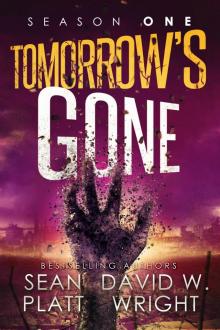 Tomorrow's Gone Season 1
Tomorrow's Gone Season 1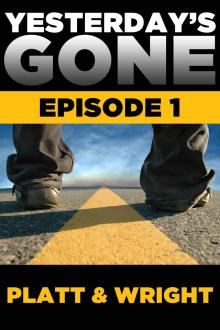 Yesterday's Gone: Episode 1
Yesterday's Gone: Episode 1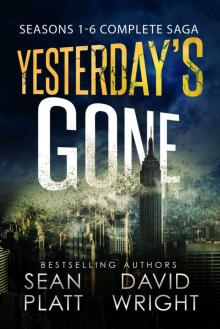 Yesterday's Gone: Seasons 1-6 Complete Saga
Yesterday's Gone: Seasons 1-6 Complete Saga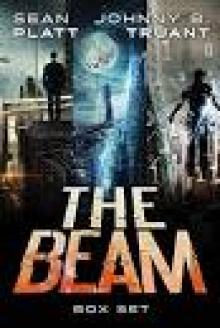 The Beam- The Complete Series
The Beam- The Complete Series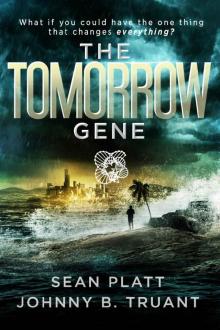 The Tomorrow Gene
The Tomorrow Gene Karma Police: Karma Police Book Two
Karma Police: Karma Police Book Two The Fall (Karma Police Book 5)
The Fall (Karma Police Book 5)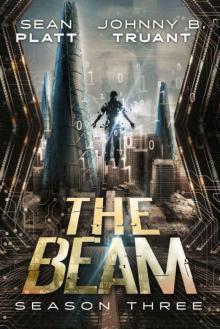 The Beam: Season Three
The Beam: Season Three Resurrection
Resurrection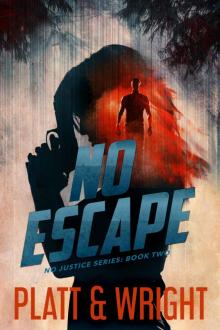 No Escape (No Justice Book 2)
No Escape (No Justice Book 2)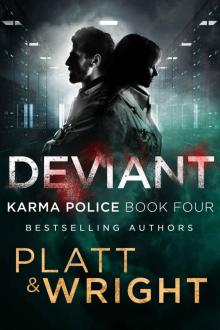 Deviant (Karma Police Book 4)
Deviant (Karma Police Book 4)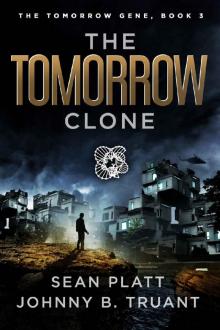 The Tomorrow Clone (The Tomorrow Gene Book 3)
The Tomorrow Clone (The Tomorrow Gene Book 3)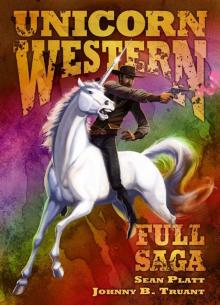 Unicorn Western
Unicorn Western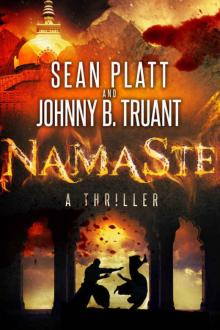 Namaste
Namaste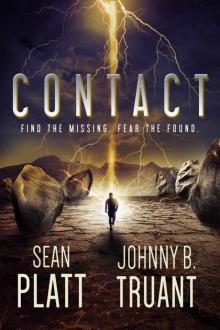 Alien Invasion (Book 2): Contact
Alien Invasion (Book 2): Contact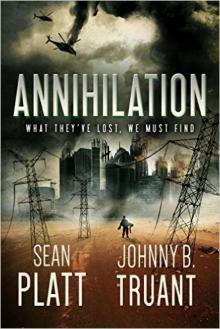 Alien Invasion (Book 4): Annihilation
Alien Invasion (Book 4): Annihilation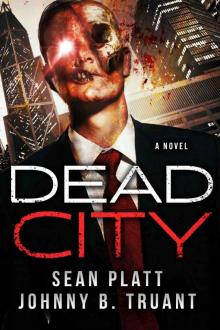 Dead City
Dead City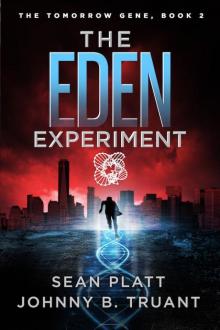 The Eden Experiment
The Eden Experiment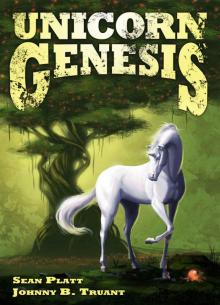 Unicorn Genesis (Unicorn Western)
Unicorn Genesis (Unicorn Western)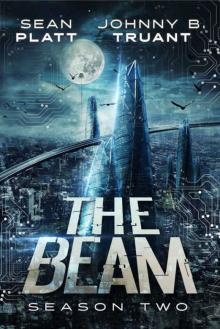 The Beam: Season Two
The Beam: Season Two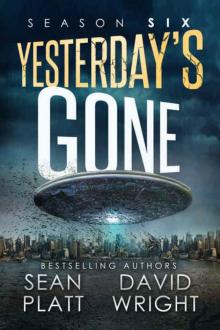 Yesterday's Gone: Season Six
Yesterday's Gone: Season Six Homecoming (Karma Police Book 6)
Homecoming (Karma Police Book 6)![[Alien Invasion 01.0] Invasion Read online](http://i1.bookreadfree.com/i1/03/30/alien_invasion_01_0_invasion_preview.jpg) [Alien Invasion 01.0] Invasion
[Alien Invasion 01.0] Invasion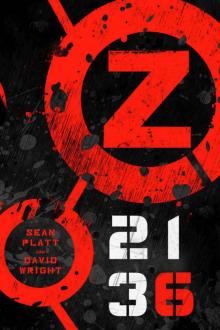 Z 2136 (Z 2134 Series Book 3)
Z 2136 (Z 2134 Series Book 3)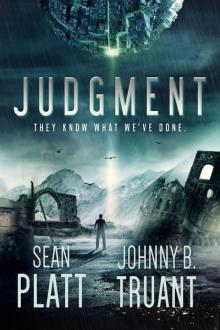 Alien Invasion (Book 5): Judgment
Alien Invasion (Book 5): Judgment Threshold
Threshold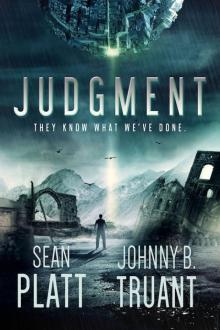 Judgment
Judgment Jumper: Karma Police Book One
Jumper: Karma Police Book One Boricio Goes Camping (Dark Crossings)
Boricio Goes Camping (Dark Crossings) Extinction
Extinction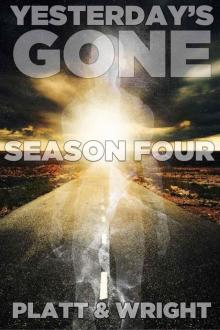 Yesterday's Gone (Season Four): Episodes 19-24
Yesterday's Gone (Season Four): Episodes 19-24![[No Justice 01.0] No Justice Read online](http://i1.bookreadfree.com/i2/04/09/no_justice_01_0_no_justice_preview.jpg) [No Justice 01.0] No Justice
[No Justice 01.0] No Justice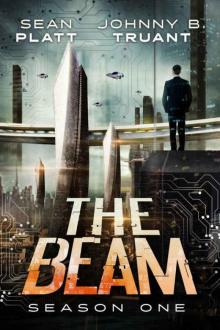 The Beam: Season One
The Beam: Season One La Fleur de Blanc
La Fleur de Blanc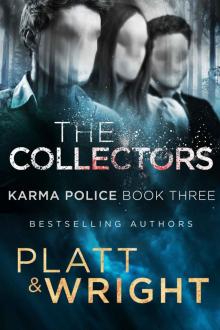 The Collectors (Karma Police Book 3)
The Collectors (Karma Police Book 3)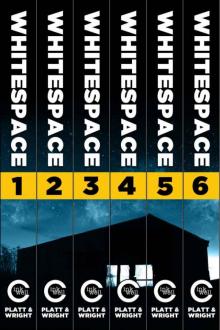 WhiteSpace: Season One (Episodes 1-6 of the sci-fi horror serial)
WhiteSpace: Season One (Episodes 1-6 of the sci-fi horror serial)